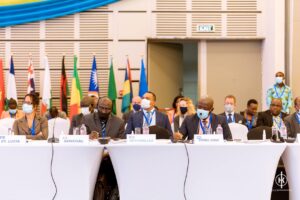The Minister for Fisheries and Aquaculture Development, Mavis Hawa Koomson, has stated that Illegal, Unreported and Unregulated (IUU) fishing is threatening the sustainability of fisheries and affecting efforts to rebuild depleted fish stocks, hence plans are far advanced to acquire boats for increasing vigilance in the country’s waters to stop the practice.
According to the minister, while natural factors such as climate change are affecting the country’s fish stock, human-induced activities such as ocean pollution and marine degradation in addition to IUU means revised measures must be adopted to address issues in the sector.

Concerning measures to address these challenges, she indicated that plans are far advanced for the acquisition of research vessels and four patrol boats for the fisheries sector in Ghana. The four patrol boats will enhance enforcement capacity to address the issue of overexploitation and overfishing, as well as curb the pervasive incidence of IUU fishing.
“It is sad to note that fish production has been declining globally, with especially developing countries experiencing overcapacity and declining profits. Our fisheries resources are overexploited due to Illegal, Unreported, Unregulated (IUU) fishing. IUU is a threat to sustainable fisheries and affects efforts to rebuild depleted fish stocks.
“It is important to mention that activities are far advanced for the acquisition of a research vessel and four patrol boats for the fisheries sector in Ghana. The research vessel will ensure regular research on physical, chemical and biological characteristics of the marine waters and exploited stocks, to enhance data availability for science-based fisheries management strategies,” she said.
The minister made these remarks in her address at the seventh meeting of ministers in charge of fisheries and aquaculture of the Organisation of African, Caribbean and Pacific States (OACPS), held in Accra-Ghana.

Mrs. Koomson, touching on the future of fisheries in the country, indicating that aquaculture is being considered as the best alternative to increase fish production, reduce imports and create jobs and wealth.
However, aquaculture production has not been sufficient to make up for the gap between fish production and demand for fish.
“Factors affecting our aquaculture development include inadequate aquaculture infrastructure, low technical capacity, high cost of inputs – especially fish feed, low capacity to manage an outbreak of disease, and weak enforcement of regulatory measures,” she outlined.
The OACPS Assistant Secretary-General, Cristelle Pratt, in her remarks stated that the OACPS ascribes special importance to the fisheries sector, as it plays a crucial and invaluable role in underpinning the food security and nutrition, employment, exports, trade and livelihoods of many countries, particularly the OACPS’ 38 small island developing states.
“We know that sustainable development of the fisheries and aquaculture sector faces tremendous challenges; and the ability to sustain the benefits to our people is at risk from fisheries governance challenges as well as human-induced challenges and pressures – such as climate change, overfishing, pollution and environmental degradation.

“This meeting has an opportunity to consider and provide guidance on our engagement in these multilateral processes, as well as the ongoing negotiations at the World Trade Organisation (WTO) which may lead to a realistic multilateral outcome on fisheries subsidies,” she said.
The Assistant Secretary-General emphasised that the OACPs conference, among others, aims at fostering a common understanding and making the best use of experience, knowledge and learning from each other, which is critical to utilising the fisheries and aquaculture sector’s full potential for national development.










